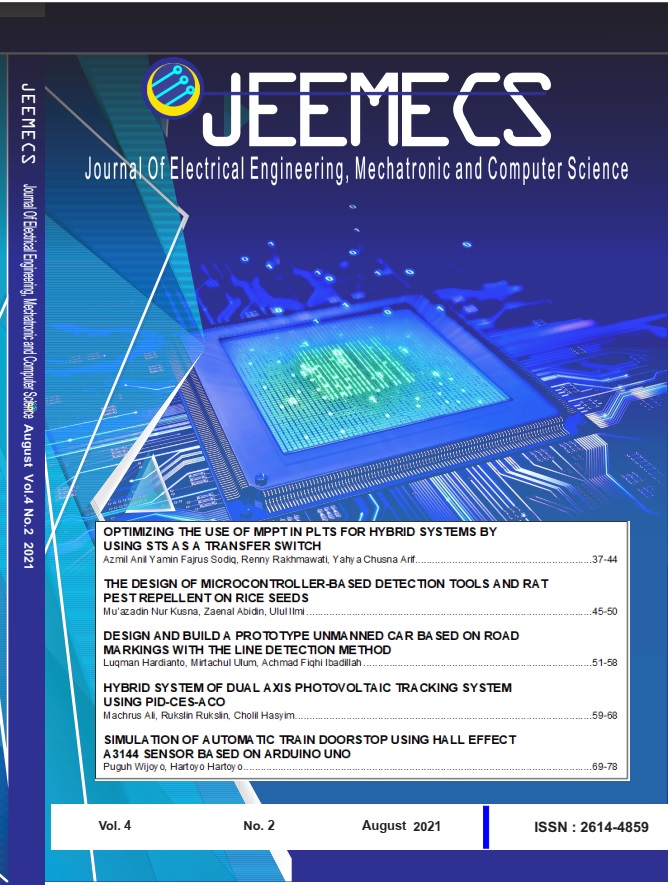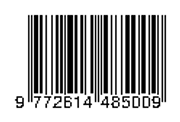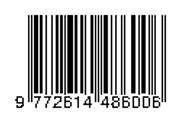Optimizing the Use of MPPT in PLTS for Hybrid Systems by Using STS as a Transfer Switch
DOI:
https://doi.org/10.26905/jeemecs.v4i2.6004Keywords:
PLTS, MPPT, Static Transfer Switch, Power QualityAbstract
To save energy nowadays is recommended to switch to renewable energy sources. In Indonesia, solar energy is abundant, so PLTS is made. The supply of PLTS is expected to reach maximum use. However, solar panels have many obstacles such as variations in temperature and sunlight intensity, MPPT systems are needed to find the maximum power point of the solar panels. Unfortunately, in Indonesia, the sunlight of short duration with the ideal irradiation time that can produce electricity from solar panels is 4 to 5 hours per day, so a PLN supply is still needed to support the continuity of the power supply. Because two sources are used, there is a problem where the load needs high continuity during power switching, so STS (Static Transfer Switch) is used for very fast power switching. Simulation results, when using EMR (Electromechanical Relay) the power transfer process takes 50ms or 5 cycles while STS takes 2ms or ¼ cycles. With very fast response to STS, sensitive equipment is kept safe from power quality disturbances such as voltage sag and voltage swell.
Downloads
References
References
S. K. Saha and Jaipal, "Optimization Technique Based Fuzzy Logic Controller for MPPT of Solar PV System," 2018 International Conference on Emerging Trends and Innovations In Engineering And Technological Research (ICETIETR), Ernakulam, India, 2018, pp. 1-5.
B. H. Hamadani and M. B. Campanelli, "Photovoltaic Characterization Under Artificial Low Irradiance Conditions Using Reference Solar Cells," in IEEE Journal of Photovoltaics, vol. 10, no. 4, pp. 1119-1125, July 2020.
A. R. Nansur, A. Syah Laili Hermawan and F. D. Murdianto, "Constant Voltage Control Using Fuzzy Logic Controller (FLC) to Overcome The Unstable Output Voltage of MPPT in DC Microgrid System," 2018 International Electronics Symposium on Engineering Technology and Applications (IES-ETA), Bali, Indonesia, 2018, pp. 19-24.
S. Narendiran, S. K. Sahoo, R. Das and A. K. Sahoo, "Fuzzy logic controller based maximum power point tracking for PV system," 2016 3rd International Conference on Electrical Energy Systems (ICEES), Chennai, India, 2016, pp. 29-34.
E. M. Vicente, P. D. Santos Vicente, R. L. Moreno, and E. R. Ribeiro, “High-efficiency MPPT method based on irradiance and temperature measurements,†IET Renewable Power Gener., vol. 14, pp. 986–995, 2020.
J.-S. Ko, J.-H. Huh, and J.-C. Kim, “Overview of maximum power point tracking methods for PV system in micro grid,†Electron., vol. 9, 2020, Art. no. 816.
Muhammad H. Rashid, Power Electronics Devices, Circuits, and Applications, Florida: Pearson Education Limited, 2014.
Antonio Luque, Steven Hegedus, Handbook of Photovoltaic Science and Engineering, Wiley, John Wiley & Sons, 2003.
Philip R. Wolfe, The Solar Generation Childhood and Adolescence of Terrestrial Photovoltaics First Edition, John Wiley & Sons, 2018.
Daniel W. Hart, Power Electronics, New York: The McGraw-Hill Companies, 2011.
M. Z. Abdullah, I. Sudiharto and R. P. Eviningsih, "Photovoltaic System MPPT using Fuzzy Logic Controller," 2020 International Seminar on Application for Technology of Information and Communication (iSemantic), Semarang, Indonesia, 2020, pp. 378-383.
A. Sannino, "Static transfer switch: analysis of switching conditions and actual transfer time," 2001 IEEE Power Engineering Society Winter Meeting. Conference Proceedings, Columbus, OH, USA, 2001, pp. 120-125 vol.1.
T. Mahmood and M. A. Choudhry, "Application of Static Transfer Switch for Feeder Reconfiguration to Improve Voltage at Critical Locations," 2006 IEEE/PES Transmission & Distribution Conference and Exposition: Latin America, Caracas, Venezuela, 2006, pp. 1-6.
"IEEE Recommended Practice for Monitoring Electric Power Quality," in IEEE Std 1159-1995, vol., no., pp.1-80, 30 Nov. 1995.
R. Rakhmawati, Irianto and B. W. Dionova, "Design and implementation of hybrid energy system for DC load applications," 2017 International Seminar on Application for Technology of Information and Communication (iSemantic), 2017, pp. 109-114.
C. A. Iskak, N. A. Windarko and R. Rakhmawati, "Design and Implementation Bidirectional DC-DC Converter for Load Sharing and Charging Battery," 2019 International Seminar on Application for Technology of Information and Communication (iSemantic), 2019, pp. 455-459.
R. Rakhmawati, Irianto, F. Dwi Murdianto and G. T. Ilman Syah, "Performance Evaluation of Speed Controller Permanent DC Motor in Electric Bike Using Fuzzy Logic Control System," 2018 International Seminar on Application for Technology of Information and Communication, 2018, pp. 110-115.
M. Q. Duong, H. Tran and C. A. Hossain, "Influence of elemental parameter in the boost and the buck converter," 2017 IEEE Region 10 Humanitarian Technology Conference (R10-HTC), 2017, pp. 528-531.
N. D. Bhat, D. B. Kanse, S. D. Patil and S. D. Pawar, "DC/DC Buck Converter Using Fuzzy Logic Controller," 2020 5th International Conference on Communication and Electronics Systems (ICCES), 2020, pp. 182-187.
K. Bendaoud et al., "Fuzzy logic controller (FLC): Application to control DC-DC buck converter," 2017 International Conference on Engineering & MIS (ICEMIS), 2017, pp. 1-5.
P. Ray and A. K. Sinha, "Modelling and simulation of grid power management with modified fuzzy logic based MPPT tracking with hybrid power energy system," 2015 International Conference on Energy, Power and Environment: Towards Sustainable Growth (ICEPE), 2015, pp. 1-6.
"IEEE Guide for Service to Equipment Sensitive to Momentary Voltage Disturbances," in IEEE Std 1250-1995, vol., no., pp.0_1-, 1995.
Downloads
Published
Issue
Section
License
Our ethic statements are based on COPE’s Best Practice Guidelines for Journal Editors.
Publication decisions
The editor is responsible for deciding which of the articles submitted to the journal should be published.
The editor may be guided by the policies of the journal's editorial board and constrained by such legal requirements as shall then be in force regarding libel, copyright infringement and plagiarism. The editor may confer with other editors or reviewers in making this decision.
Fair play
An editor at any time evaluate manuscripts for their intellectual content without regard to race, gender, sexual orientation, religious belief, ethnic origin, citizenship, or political philosophy of the authors.
Confidentiality
The editor and any editorial staff must not disclose any information about a submitted manuscript to anyone other than the corresponding author, reviewers, potential reviewers, other editorial advisers, and the publisher, as appropriate.
Disclosure and conflicts of interest
Unpublished materials disclosed in a submitted manuscript must not be used in an editor's own research without the express written consent of the author.
Duties of Reviewers
Contribution to Editorial Decisions
Peer review assists the editor in making editorial decisions and through the editorial communications with the author may also assist the author in improving the paper.
Promptness
Any selected referee who feels unqualified to review the research reported in a manuscript or knows that its prompt review will be impossible should notify the editor and excuse himself from the review process.
Confidentiality
Any manuscripts received for review must be treated as confidential documents. They must not be shown to or discussed with others except as authorized by the editor.
Standards of Objectivity
Reviews should be conducted objectively. Personal criticism of the author is inappropriate. Referees should express their views clearly with supporting arguments.
Acknowledgement of Sources
Reviewers should identify relevant published work that has not been cited by the authors. Any statement that an observation, derivation, or argument had been previously reported should be accompanied by the relevant citation. A reviewer should also call to the editor's attention any substantial similarity or overlap between the manuscript under consideration and any other published paper of which they have personal knowledge.
Disclosure and Conflict of Interest
Privileged information or ideas obtained through peer review must be kept confidential and not used for personal advantage. Reviewers should not consider manuscripts in which they have conflicts of interest resulting from competitive, collaborative, or other relationships or connections with any of the authors, companies, or institutions connected to the papers.
Duties of Authors
Reporting standards
Authors of reports of original research should present an accurate account of the work performed as well as an objective discussion of its significance. Underlying data should be represented accurately in the paper. A paper should contain sufficient detail and references to permit others to replicate the work. Fraudulent or knowingly inaccurate statements constitute unethical behavior and are unacceptable.
Originality and Plagiarism
The authors should ensure that they have written entirely original works, and if the authors have used the work and/or words of others that this has been appropriately cited or quoted.
Multiple, Redundant or Concurrent Publication
An author should not in general publish manuscripts describing essentially the same research in more than one journal or primary publication. Submitting the same manuscript to more than one journal concurrently constitutes unethical publishing behaviour and is unacceptable.
Acknowledgement of Sources
Proper acknowledgment of the work of others must always be given. Authors should cite publications that have been influential in determining the nature of the reported work.
Authorship of the Paper
Authorship should be limited to those who have made a significant contribution to the conception, design, execution, or interpretation of the reported study. All those who have made significant contributions should be listed as co-authors. Where there are others who have participated in certain substantive aspects of the research project, they should be acknowledged or listed as contributors.
The corresponding author should ensure that all appropriate co-authors and no inappropriate co-authors are included on the paper, and that all co-authors have seen and approved the final version of the paper and have agreed to its submission for publication.
Disclosure and Conflicts of Interest
All authors should disclose in their manuscript any financial or other substantive conflict of interest that might be construed to influence the results or interpretation of their manuscript. All sources of financial support for the project should be disclosed.
Fundamental errors in published works
When an author discovers a significant error or inaccuracy in his/her own published work, it is the author’s obligation to promptly notify the journal editor or publisher and cooperate with the editor to retract or correct the paper.











